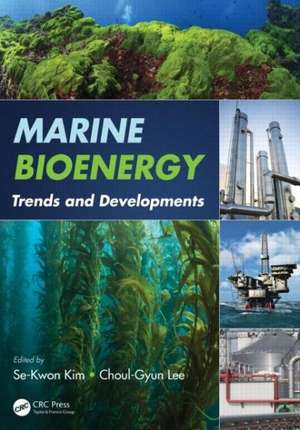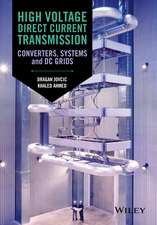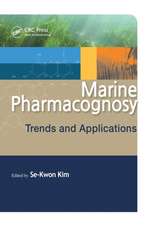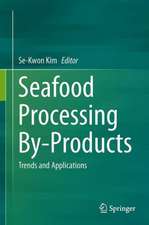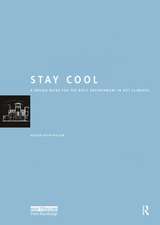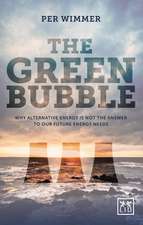Marine Bioenergy: Trends and Developments
Editat de Se-Kwon Kim, Choul-Gyun Leeen Limba Engleză Hardback – 20 mai 2015
- Offers an introduction to marine bioenergy
- Explores marine algae as a source of bioenergy
- Describes biotechnological techniques for biofuel production
- Explains the production of bioenergy, including bioethanol, biomethane, biomethanol, biohydrogen, and biodiesel
- Covers bioelectricity and marine microbial fuel cell (MFC) production from marine algae and microbes
- Discusses marine waste for bioenergy
- Considers commercialization and the global market
Preț: 1428.11 lei
Preț vechi: 2058.71 lei
-31% Nou
Puncte Express: 2142
Preț estimativ în valută:
273.31€ • 284.28$ • 225.63£
273.31€ • 284.28$ • 225.63£
Carte tipărită la comandă
Livrare economică 15-29 aprilie
Preluare comenzi: 021 569.72.76
Specificații
ISBN-13: 9781482222371
ISBN-10: 148222237X
Pagini: 769
Ilustrații: 88 black & white illustrations, 103 black & white tables
Dimensiuni: 178 x 254 x 38 mm
Greutate: 1.77 kg
Ediția:1
Editura: CRC Press
Colecția CRC Press
ISBN-10: 148222237X
Pagini: 769
Ilustrații: 88 black & white illustrations, 103 black & white tables
Dimensiuni: 178 x 254 x 38 mm
Greutate: 1.77 kg
Ediția:1
Editura: CRC Press
Colecția CRC Press
Cuprins
Introduction to Marine Bioenergy. Biofuel Sources. Biotechnological Techniques in Marine Bioenergy. Production of Bioenergy. Bioelectricity and Microbial Fuel Cells. Marine Waste for Bioenergy. Commercialization and Global Market.
Notă biografică
Se-Kwon Kim is a distinguished professor in the Department of Marine-Bio Convergence Science and the director of the Marine Bioprocess Research Center at Pukyong National University, Busan, South Korea. He received his M.Sc and Ph.D from Pukyong National University, and conducted his postdoctoral studies at the Laboratory of Biochemical Engineering, University of Illinois at Urbana–Champaign, USA. He has served as a visiting scientist at the Memorial University of Newfoundland, St. John's, Canada; president of the Korean Society of Chitin and Chitosan and the Korean Society of Marine Biotechnology; chairman of the 7th Asia-Pacific Chitin and Chitosan Symposium; and chief editor at the Korean Society of Fisheries and Aquatic Science. Widely published, Dr. Kim holds 76 patents and is a board member of the International Society of Marine Biotechnology and the International Society of Nutraceuticals and Functional Food.
Choul-Gyun Lee is a professor in the Department of Biological Engineering at Inha University, Incheon, South Korea. He is also the director of the National Marine Bioenergy Research and Development Consortium funded by the Korean government, president of the Korean Society of Marine Biotechnology, chair of the Interdisciplinary Program on Future Energy Engineering, and head of the Institute of Industrial Biotechnology as well as the Lipidomics Research Center. He received his Ph.D from the Department of Chemical Engineering, University of Michigan, Ann Arbor, USA, and worked on the Advance Life Support Team at NASA’s John F. Kennedy Space Center, Cape Canaveral, Florida, USA before joining Inha University, where he has held a number of administrative positions. In addition, Dr. Lee has served as either an editorial board member or an associate editor for six different journals.
Choul-Gyun Lee is a professor in the Department of Biological Engineering at Inha University, Incheon, South Korea. He is also the director of the National Marine Bioenergy Research and Development Consortium funded by the Korean government, president of the Korean Society of Marine Biotechnology, chair of the Interdisciplinary Program on Future Energy Engineering, and head of the Institute of Industrial Biotechnology as well as the Lipidomics Research Center. He received his Ph.D from the Department of Chemical Engineering, University of Michigan, Ann Arbor, USA, and worked on the Advance Life Support Team at NASA’s John F. Kennedy Space Center, Cape Canaveral, Florida, USA before joining Inha University, where he has held a number of administrative positions. In addition, Dr. Lee has served as either an editorial board member or an associate editor for six different journals.
Recenzii
"… presents a wide knowledge coverage, from marine biomass, biofuel sources, biotechnological and production techniques in marine bioenergy, marine waste for bioenergy, microbial fuel cells, and bioelectricity to global business. The collection of chapters is a remarkable contribution of various researchers from South Korea, Canada, China, USA, UK, India, Thailand, Turkey, Hong Kong, Japan, and Indonesia. … The book is a one-stop information resource from molecules to commercialization."
—Wong Tin Wui, Non-Destructive Biomedical and Pharmaceutical Research Centre, Universiti Teknologi MARA, Shah Alam, Malaysia
"This book tempts any reader to own it. The information gathered is up to the minute. … The contributors use extraordinary style in giving pictorial representations which will enable even the novice readers to understand the subject. … The book provides a valuable window to marine bioenergy."
—Dr. P.N. Sudha, Thiruvalluvar University, Vellore, India
—Wong Tin Wui, Non-Destructive Biomedical and Pharmaceutical Research Centre, Universiti Teknologi MARA, Shah Alam, Malaysia
"This book tempts any reader to own it. The information gathered is up to the minute. … The contributors use extraordinary style in giving pictorial representations which will enable even the novice readers to understand the subject. … The book provides a valuable window to marine bioenergy."
—Dr. P.N. Sudha, Thiruvalluvar University, Vellore, India
Descriere
This book features the latest findings of leading marine bioenergy scientists from around the world. Addressing the key aspects of marine bioenergy, this state-of-the-art text offers an introduction to marine bioenergy, explores marine algae as a source of bioenergy, describes biotechnological techniques for biofuel production, and explains the production of bioenergy, including bioethanol, biomethane, biomethanol, biohydrogen, and biodiesel. It also covers bioelectricity and marine microbial fuel cell production from marine algae and microbes, discusses marine waste for bioenergy, and considers commercialization and the global market.
